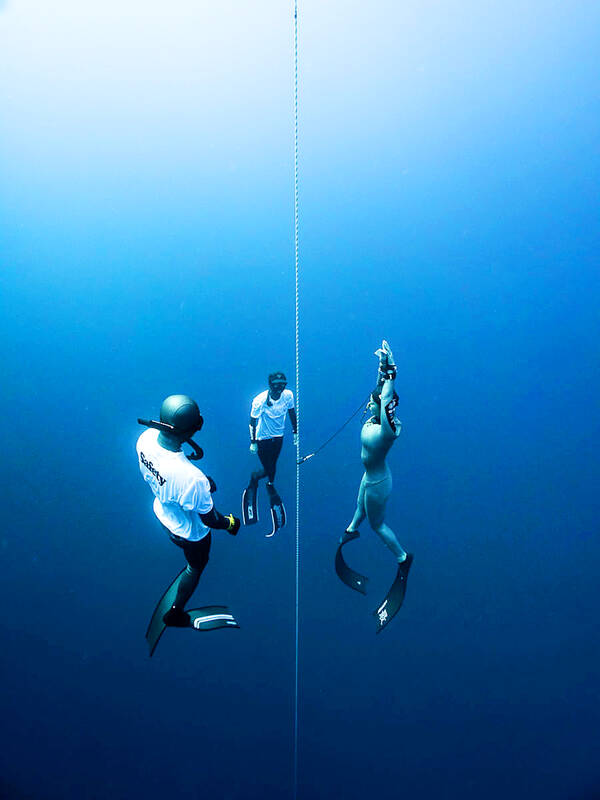A law regulating free diving is needed to protect public safety and the environment, Democratic Progressive Party Legislator Chao Tien-lin (趙天麟) said on Wednesday in a call on the Ministry of Transportation and Communications’ Tourism Bureau to take legislative action.
Chao made the comment at a news conference in the Legislative Yuan in Taipei.
In response, the bureau said that officials have completed a draft and scheduled it for discussion with the public and outside agencies on Aug. 15, with the goal of passing the law by the end of the year.

Photo courtesy of the Taiwan Freediving Development Association
Taiwan is experiencing a surge of interest in free diving, which brings vast business opportunities and challenges for the government to keep divers safe and the oceans unpolluted, Chao said.
Regulations Governing Water Recreation Activities (水域遊憩活動管理辦法) narrowly defines diving activities as diving with the aid of snorkels or scuba gear, leaving free diving entirely unregulated, he said.
The government should fill the regulatory gap, he said.
For-profit water sports are obligated to provide mandatory liability insurance according to the Act for the Development of Tourism (展觀光條例), but only one-third of Taiwanese diving instructors are insured, he said.
The lack of regulations put amateur enthusiasts at risk, as they might misjudge their skill level, stamina or weather, while diving tour groups sometimes behave badly around protected reefs, Pingtung Professional Union of Diving Instructors chairman Chan Hao-yu (詹皓宇) said.
Unskilled tourists often cause harm by trampling on coral, and tour groups are known to get into protected waters or sea lanes reserved for commercial fishing boats, he said.
Self-employed diving instructors qualify for insurance policies, which are carried by two domestic insurance companies, said Ting Yu-sheng (丁豫聖), a member of the Non-Life Insurance Association of the Republic of China.
The bureau has completed a draft and it anticipates that modifications would be made following discussions with officials, experts and the industry, bureau section chief Lin Hsiu-hsia (林秀霞) said.

Chinese Nationalist Party (KMT) Chairman Eric Chu (朱立倫), spokeswoman Yang Chih-yu (楊智伃) and Legislator Hsieh Lung-chieh (謝龍介) would be summoned by police for questioning for leading an illegal assembly on Thursday evening last week, Minister of the Interior Liu Shyh-fang (劉世芳) said today. The three KMT officials led an assembly outside the Taipei City Prosecutors’ Office, a restricted area where public assembly is not allowed, protesting the questioning of several KMT staff and searches of KMT headquarters and offices in a recall petition forgery case. Chu, Yang and Hsieh are all suspected of contravening the Assembly and Parade Act (集會遊行法) by holding

PRAISE: Japanese visitor Takashi Kubota said the Taiwanese temple architecture images showcased in the AI Art Gallery were the most impressive displays he saw Taiwan does not have an official pavilion at the World Expo in Osaka, Japan, because of its diplomatic predicament, but the government-backed Tech World pavilion is drawing interest with its unique recreations of works by Taiwanese artists. The pavilion features an artificial intelligence (AI)-based art gallery showcasing works of famous Taiwanese artists from the Japanese colonial period using innovative technologies. Among its main simulated displays are Eastern gouache paintings by Chen Chin (陳進), Lin Yu-shan (林玉山) and Kuo Hsueh-hu (郭雪湖), who were the three young Taiwanese painters selected for the East Asian Painting exhibition in 1927. Gouache is a water-based

Taiwan would welcome the return of Honduras as a diplomatic ally if its next president decides to make such a move, Minister of Foreign Affairs Lin Chia-lung (林佳龍) said yesterday. “Of course, we would welcome Honduras if they want to restore diplomatic ties with Taiwan after their elections,” Lin said at a meeting of the legislature’s Foreign Affairs and National Defense Committee, when asked to comment on statements made by two of the three Honduran presidential candidates during the presidential campaign in the Central American country. Taiwan is paying close attention to the region as a whole in the wake of a

OFF-TARGET: More than 30,000 participants were expected to take part in the Games next month, but only 6,550 foreign and 19,400 Taiwanese athletes have registered Taipei city councilors yesterday blasted the organizers of next month’s World Masters Games over sudden timetable and venue changes, which they said have caused thousands of participants to back out of the international sporting event, among other organizational issues. They also cited visa delays and political interference by China as reasons many foreign athletes are requesting refunds for the event, to be held from May 17 to 30. Jointly organized by the Taipei and New Taipei City governments, the games have been rocked by numerous controversies since preparations began in 2020. Taipei City Councilor Lin Yen-feng (林延鳳) said yesterday that new measures by